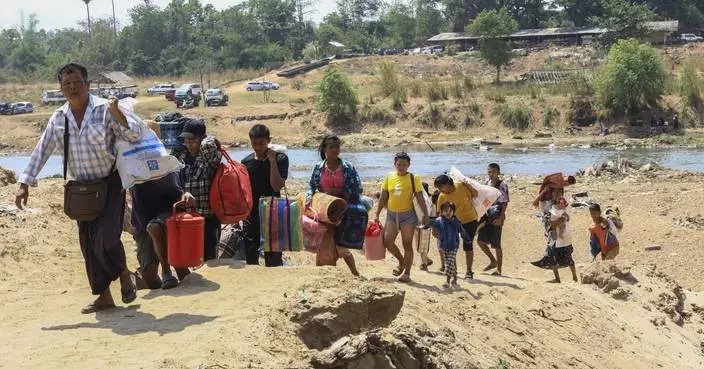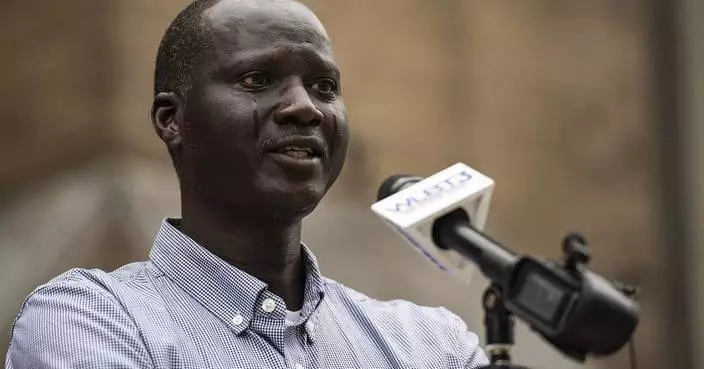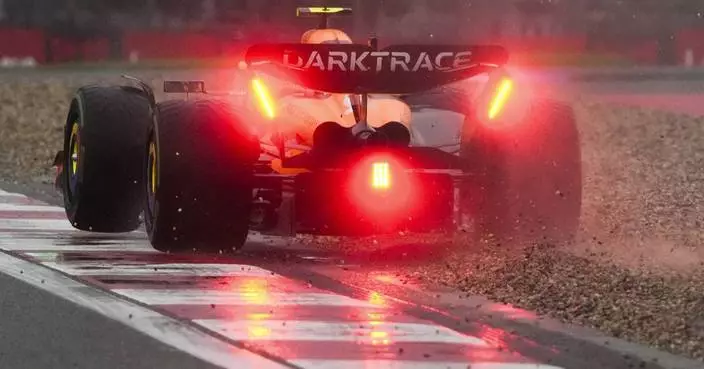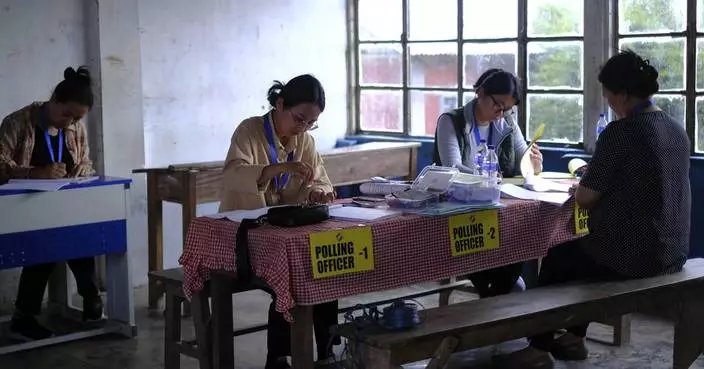Officials in Cambodia said Friday they have arrested 175 Chinese citizens after a tipoff from Chinese police about their suspected involvement in an internet phone scam.
The Interior Ministry's immigration investigation chief, Gen. Ouk Haiseila, said the suspects were arrested Wednesday in the western town of Poipet on the Thai border.
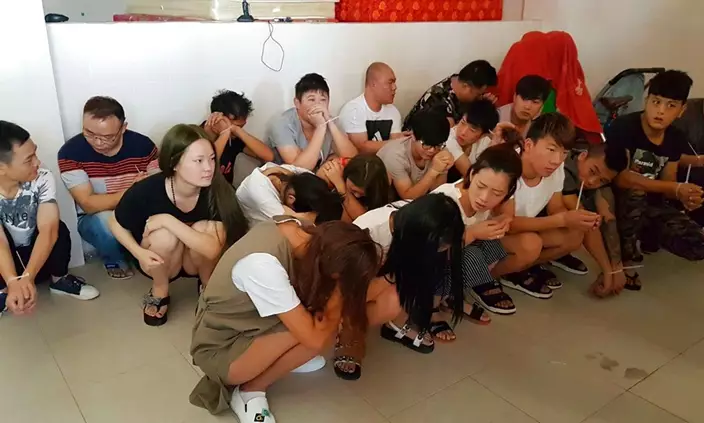
Over a dozen detained fraud suspects, at the immigration office in Poipet. (AP Photo)
The arrests are the latest in a crackdown in the region on Chinese gangs that make phone calls made over the internet to extort or trick people into transferring money to them.
There have been similar cases in the past few weeks in Thailand and Indonesia. Most of the targets appear to be fellow Chinese, and suspects are generally quickly deported to China. Chinese police often take part in raids on the gangs.
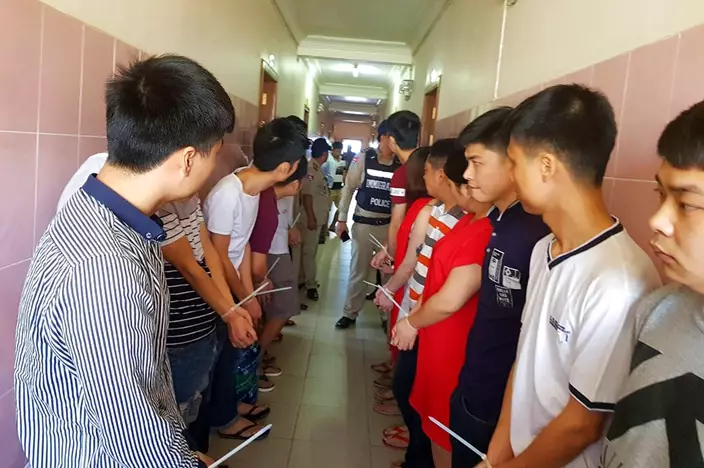
(AP Photo)
Since 2012, almost 1,000 Chinese and Taiwanese accused of taking part in internet scams have been arrested in Cambodia and deported to China. Recent raids in the capital, Phnom Penh, captured several dozen people, but others have been arrested in recent years in Kandal and Svay Rieng provinces and the seaside town of Sihanoukville, where 166 suspects were detained in coordinated raids in November 2015.
The suspects in the latest raid apparently used the same tactics as a gang of 31 arrested last month in Phnom Penh.
In that case, the gang allegedly contacted women over social media and tricked them into exchanging nude or sexy photos, and then extorted money from them by threatening to circulate the pictures online.
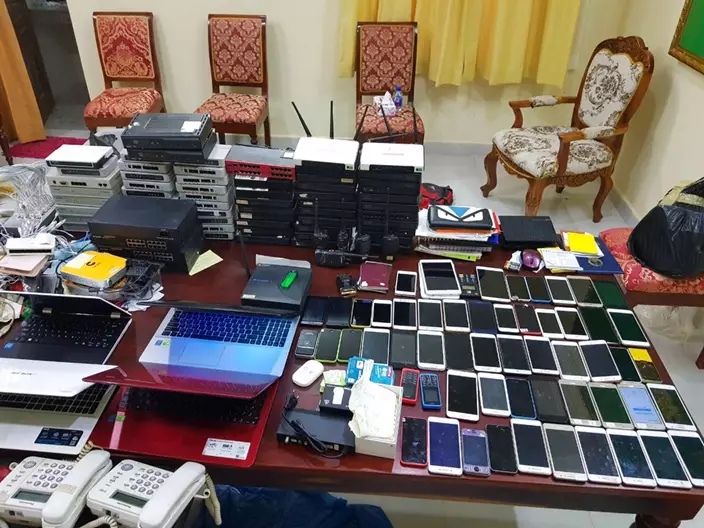
Numerous telephones, mobile phones and computer networking equipment confiscated from fraud suspects at the immigration office in Poipet. (AP Photo)
Ouk Haiseila said that in addition to seizing telecommunications equipment in Poipet, police found documents with the names of several thousand potential victims.
He said the suspects told interrogators that fellow Chinese lured them to Cambodia to work as goods promoters or in offices, but after they arrived, they were trained in IT skills such as using the internet to make phone calls.
Last month, police in neighboring Thailand arrested 44 people — 19 Chinese citizens and 25 Taiwanese — who they said made internet calls in which they claimed to be banking officials and accused their targets of financial crimes.
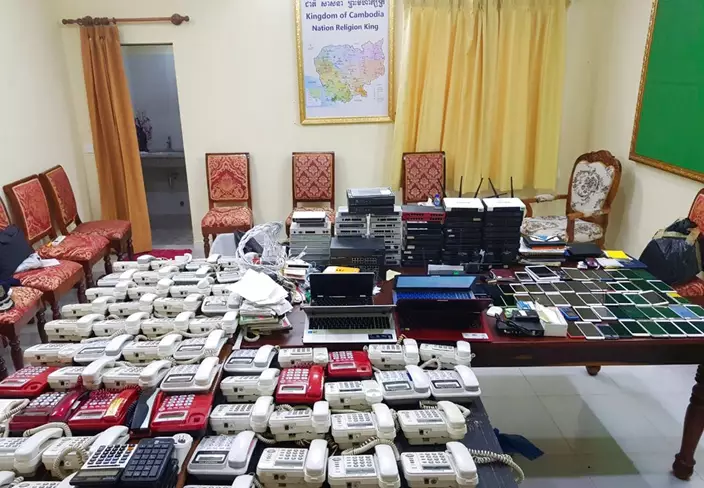
Numerous telephones, mobile phones and computer networking equipment confiscated from fraud suspects at the immigration office in Poipet. (AP Photo)
The targets would then be put in touch with a fake policeman — also at the gang's headquarters — and told they could escape arrest by transferring the allegedly stolen money to a bank account belonging to the scam artists.
The same scheme was allegedly used in Indonesia, where police arrested 153 suspects last month.
A major issue in such arrests, which normally end in deportation, is where the suspects are deported to. Although Taiwan maintains it is independent, Taiwanese suspects have often been deported to China, a measure of China's diplomatic influence backing its claim that Taiwan is part of its territory.
PHNOM PENH, Cambodia (AP) — Chinese Foreign Minister Wang Yi arrived in Cambodia on Sunday for a three-day official visit to reaffirm ties with Beijing’s closest ally in Southeast Asia. His visit is the last stop on a three-nation regional swing that also took him to Indonesia and Papua New Guinea.
He is visiting amid foreign concerns about two big Chinese-funded projects in Cambodia — a planned canal and a naval base — that critics allege could aid Beijing’s strategic military interests in Southeast Asia.
China is Cambodia’s most important ally and benefactor, with strong influence in its economy. That is illustrated by numerous Chinese-funded projects — particularly infrastructure, including airports and roads, but also private projects such as hotels, casinos and property development. More than 40% of Cambodia’s $10 billion in foreign debt is owed to China.
Wang is scheduled to have separate meetings with Prime Minister Hun Manet and his father, Hun Sen, now serving as president of the Senate after serving for 38 years as Cambodia’s head of government until he stepped down last year to be succeeded by his son. Wang was also granted a royal audience with King Norodom Sihamoni.
Hun Manet has shown no sign of deviating from his father’s pro-Beijing foreign policy. In August 2023, Wang visited Cambodia just days after Hun Sen announced he would step down as prime minister in favor of his eldest son.
Beijing’s support allows Cambodia to disregard Western concerns about its poor record on human and political rights, and in turn Cambodia generally supports Beijing’s positions on foreign policy issues such as its territorial claims in the South China Sea.
Cambodia has recently reiterated its determination to go ahead with the Chinese-financed 180-kilometer (112-mile) long, $1.7 billion Funan Techo Canal project across four provinces in the southern part of the country to connect the capital, Phnom Penh, to the Gulf of Thailand.
The plan has raised concern from neighboring Vietnam, where some scholars speculated the 100-meter (330-foot) -wide and 5.4 meter (18-foot) -deep canal could make it easier for China to send military forces southward, close to Vietnam’s southern coast. There are often frosty relations between Vietnam and its massive northern neighbor China, which aggressively claims maritime territory claimed by Hanoi and in 1979 staged a brief invasion.
The United States has also weighed in on the project, appealing for transparency on the part of Cambodia's government. Wesley Holzer, a U.S. Embassy spokesperson in Phnom Penh, was quoted as telling the Voice of America that “the Cambodian people, along with people in neighboring countries and the broader region, would benefit from transparency on any major undertaking with potential implications for regional water management, agricultural sustainability, and security,”
Hun Manet, speaking Thursday to government officials and villagers in southern Takeo province, dismissed the Vietnamese concern and vowed to push forward with the project, which he said would provide a huge benefit to Cambodia.
China also is involved with another project causing foreign concern, its Ream Naval Base on the Gulf of Thailand , which the United States and some international security analysts say is destined to serve as a strategic outpost for Beijing’s navy.
The Ream base initially attracted attention in 2019 when The Wall Street Journal reported that an early draft of an agreement seen by U.S. officials would allow China 30 years' use of the base, where it would be able to post military personnel, store weapons and berth warships.
Hun Sen in response repeatedly denied there was such an agreement, pointing out that Cambodia’s constitution does not allow foreign military bases to be established on its soil and declaring that visiting ships from all nations are welcome.
The base is situated on the Gulf of Thailand, adjacent to the South China Sea, where China has aggressively asserted its claim to virtually the entire strategic waterway. The U.S. has refused to recognize China’s sweeping claims and routinely conducts military maneuvers there to reinforce its status as international waters.
On Dec. 7, two Chinese naval vessels became the first ships to dock at a new pier at the base, coinciding with an official visit to Cambodia by China’s top defense official.
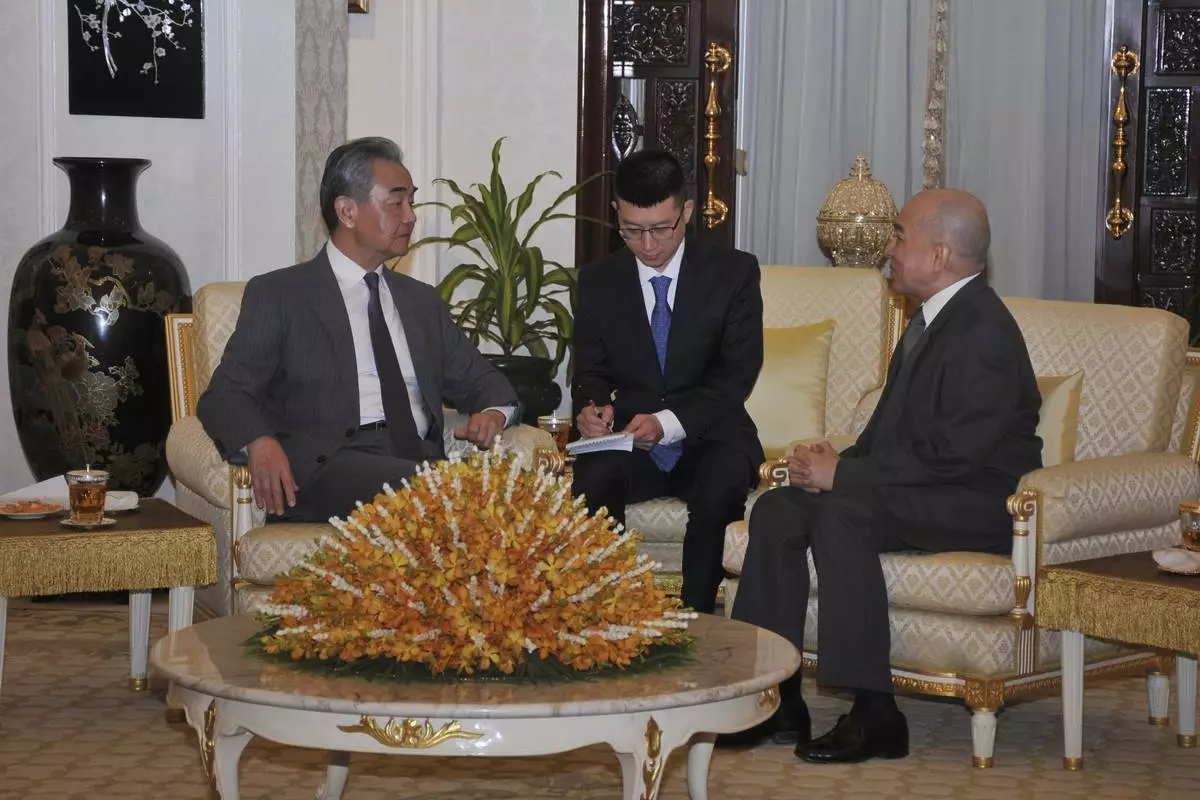
In this photo released by Agence Kampuchea Press (AKP), Chinese Foreign Minister Wang Yi, left, is welcome meeting by Cambodia's King Norodom Sihamoni, right, in Royal Palace, in Phnom Penh, Cambodia, Sunday, April 21, 2024. Wang Yi, arrived Cambodia to mark his 3 days official visit (21-23 April) Cambodia to reaffirm his country's commitment and to boost the already firmly tied to southeast Asian country, twice visited in the last eight months. (AKP via AP)
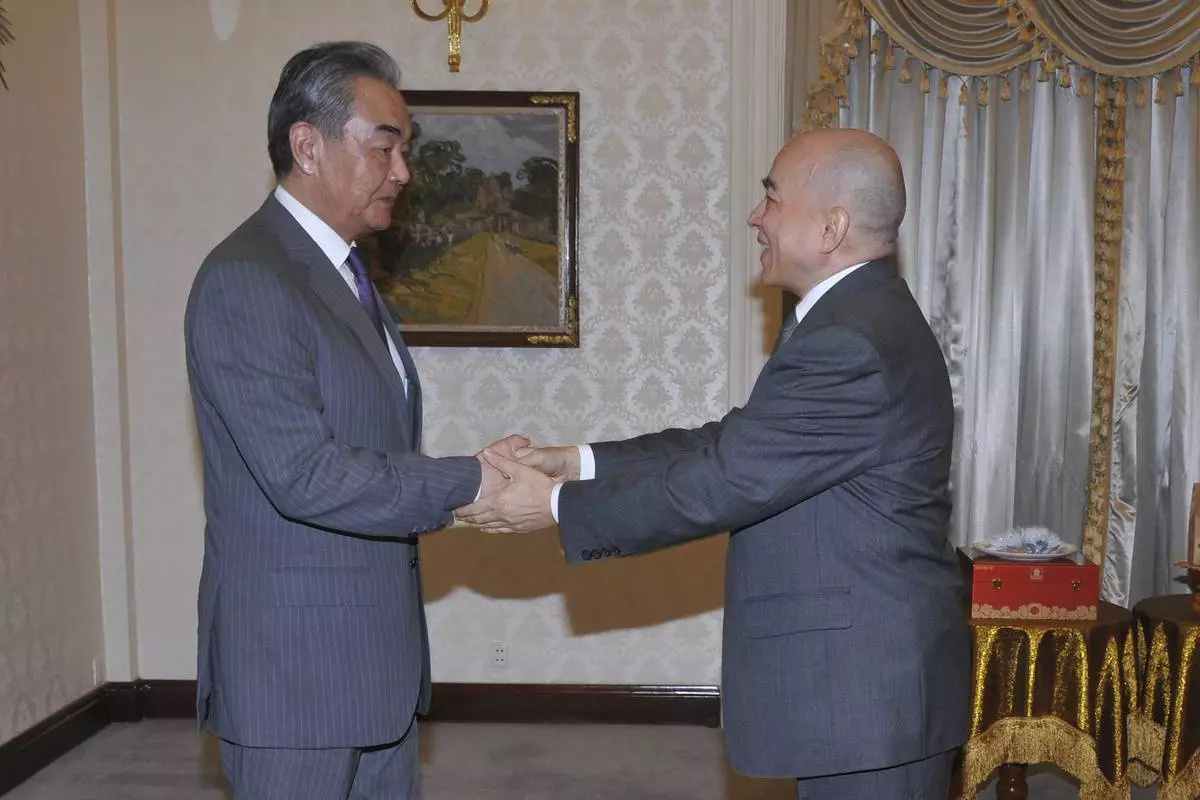
In this photo released by Agence Kampuchea Press (AKP), Chinese Foreign Minister Wang Yi, left, greets with Cambodia's King Norodom Sihamoni, right, in Royal Palace, in Phnom Penh, Cambodia, Sunday, April 21, 2024. Wang Yi, arrived Cambodia to mark his 3 days official visit (21-23 April) Cambodia to reaffirm his country's commitment and to boost the already firmly tied to southeast Asian country, twice visited in the last eight months. (AKP via AP)
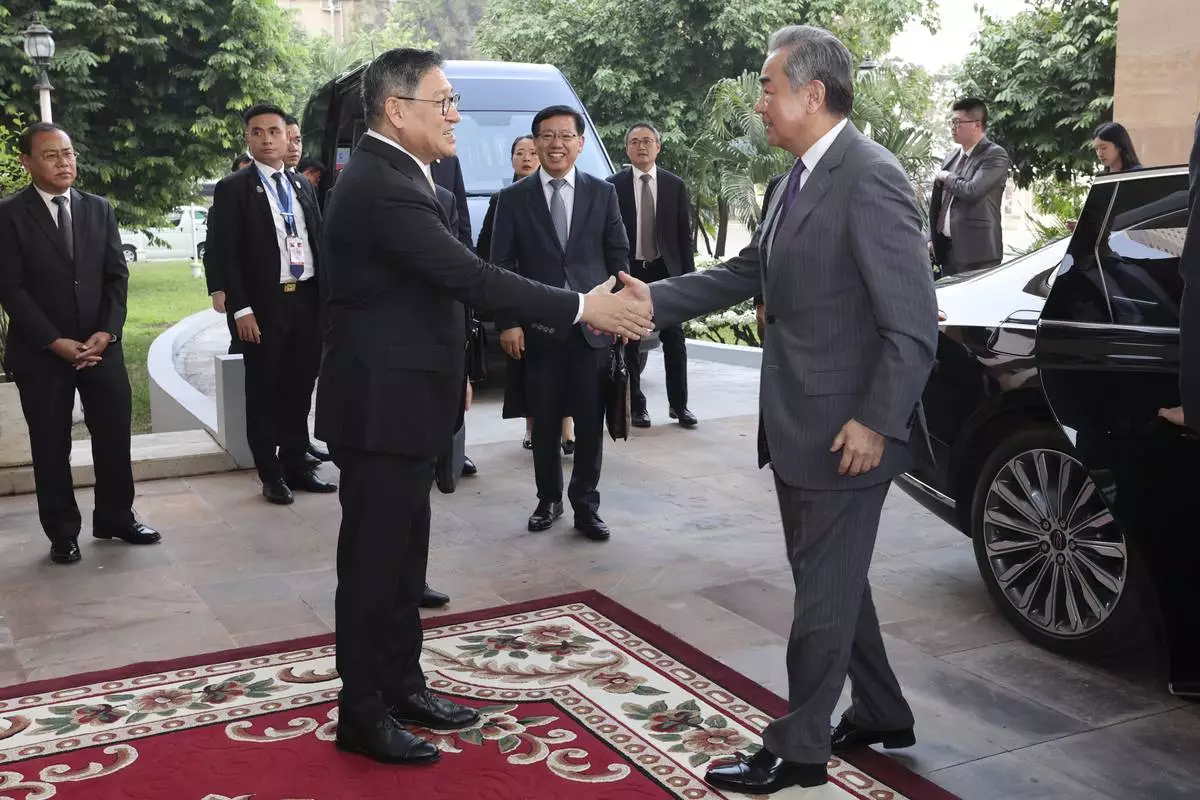
In this photo released by Agence Kampuchea Press (AKP), Chinese Foreign Minister Wang Yi, front right, greets with Cambodia's Foreign Minister, SOK Chenda Sophea, front left, in Phnom Penh, Cambodia, Sunday, April 21, 2024. Wang Yi, arrived Cambodia to mark his 3 days official visit (21-23 April) Cambodia to reaffirm his country's commitment and to boost the already firmly tied to southeast Asian country, twice visited in the last eight months. (AKP via AP)
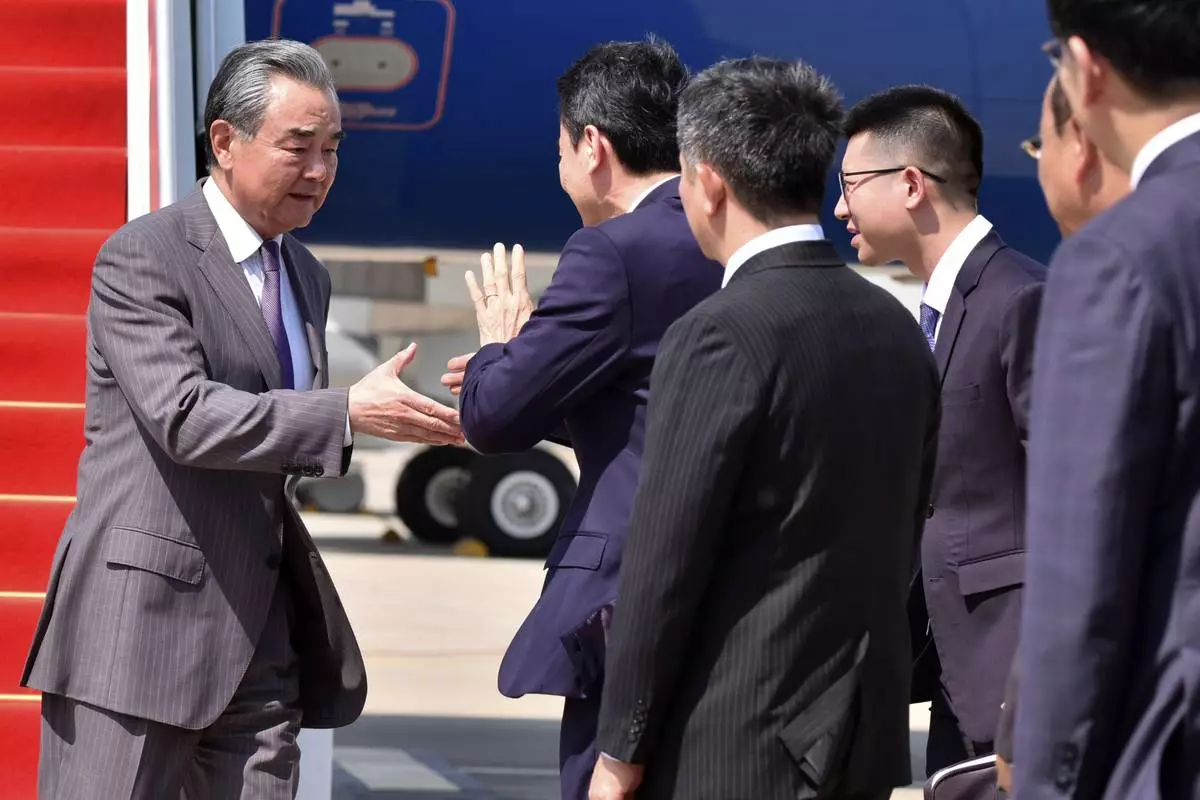
In this photo released by Agence Kampuchea Press (AKP), Chinese Foreign Minister Wang Yi, left. is greeted on his arrival at Phnom Penh International Airport in Phnom Penh, Cambodia, Sunday, April 21, 2024. (AKP via AP)
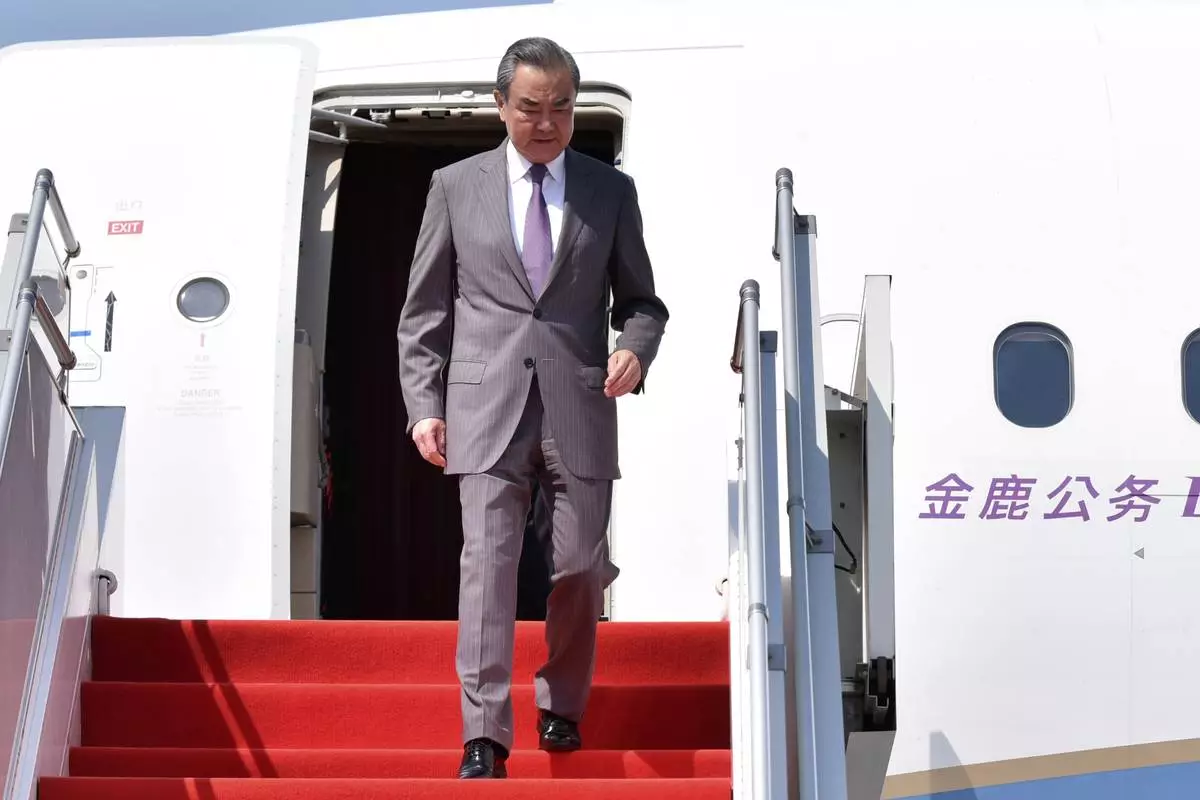
In this photo released by Agence Kampuchea Press (AKP), Chinese Foreign Minister Wang Yi arrives at Phnom Penh International Airport in Phnom Penh, Cambodia, Sunday, April 21, 2024. (AKP via AP)
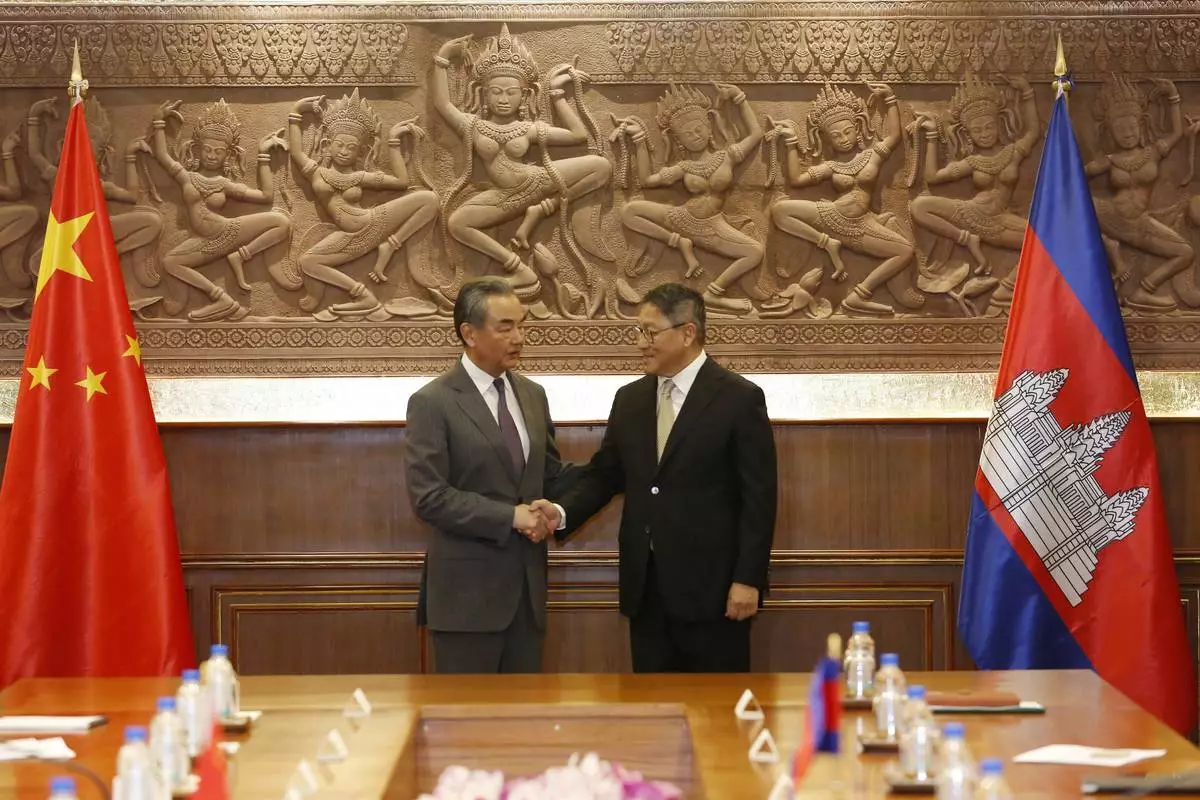
In this photo released by Agence Kampuchea Press (AKP), Chinese Foreign Minister Wang Yi, left, greets with Cambodia's Foreign Minister, SOK Chenda Sophea, right, in Phnom Penh, Cambodia, Sunday, April 21, 2024. Wang Yi, arrived Cambodia to mark his 3 days official visit (21-23 April) Cambodia to reaffirm his country's commitment and to boost the already firmly tied to southeast Asian country, twice visited in the last eight months. (AKP via AP)














